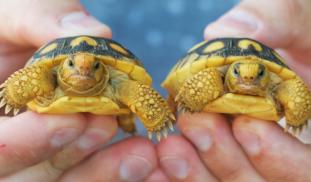Please wait...
About This Project
Low fecundity has been reported for many gopher tortoise (Gopherus polyphemus) aggregations in south Florida, implying an unsustainable population structure. We will conduct a comprehensive health assessment on a previously unstudied group of gopher tortoises in south Florida, to determine baseline demographic and epidemiology parameters, and to help explain fecundity differences in ecologically and geographically similar aggregations.
More Lab Notes From This Project

Browse Other Projects on Experiment
Related Projects
Do Australian bats have what it takes to survive the deadly White Nose Syndrome?
Australian bats are at risk from the deadly fungal disease White Nose Syndrome (WNS), which is expected...
Are climate change and air pollution triggering cardiovascular disease?
Ongoing global climate change and air pollution emissions pose a major threat to cardiovascular health...
Can blood lactate levels help guide treatment for birds suffering from monofilament line entanglement injuries?
Fishing line entanglement injuries are a common problem affecting over 200 different wildlife species globally...


